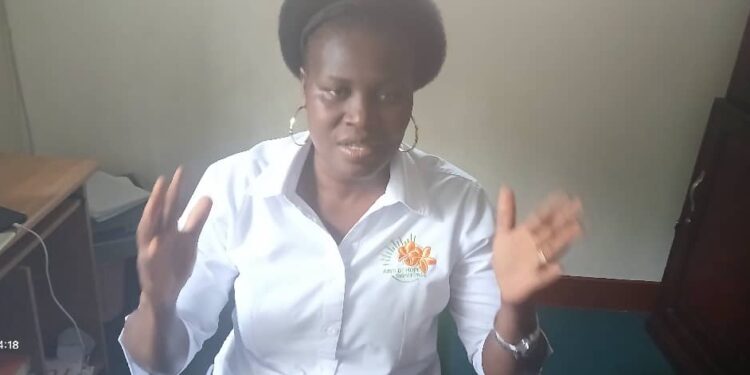The Golf Course in Jinja City will host the sixth edition of the Cancer Run on October 26, 2024, bringing together experts, well-wishers, and partners to raise awareness about cervical cancer.
Organized by Rays of Hope Hospice Jinja, a non-profit organization providing palliative care to terminally ill patients in Busoga, the event’s theme is “Detect, Treat, Defeat”
Uganda’s Third Deputy Prime Minister, Hajjat Rukia Isanga Nakadama, who is also the Minister Without Portfolio, will flag off participants who will run 10km, ride 15km or walk 5km.
MPs like Jinja City Woman MP Hon Manjeri Kyebakutika, Hon Nathan Samson Igeme Nabeta, Hon Dr Timothy Lusala Batuwa, Mayor Alton Peter Kasolo, Jinja Council Speaker Bernard Mbayo, among others are also expected to grace the occasion.
According to Sylvia Nakami, the Executive Director of Rays of Hope Hospice Jinja, the key objective is to increase public awareness about cervical cancer, which burdens families and the government.
Nakami emphasized awareness creation, community education, and advocacy as crucial in combating the disease.
“…unfortunately, many people in the region still believe in negative myths and misconceptions, attributing cervical cancer to witchcraft, which we must collectively tackle…” she says.
Since 2018, Ms Sylvia Nakami says the organization located on Plot 118, along the swanky Kiira Road, has screened nearly 10,000 women for cervical and breast cancer, facilitating early treatment for over 500 women.
They have also supported over 8,000 patients, with 972 showing significant improvement and no longer requiring palliative care.
Ms. Nakami urges all residents, including political, cultural, and religious leaders, to participate in the event that kicks off at 7am and supports the fight against cervical cancer.
Cervical and breast cancers are significant public health concerns, particularly in low-income countries like Uganda.
Ms. Sylvia Nakami also expresses concern that fear and stigma drive many women to delay seeking medical attention for cervical cancer. “…more often, they only report to health facilities when the disease has advanced to stage three or four, and there is nothing much that can be done apart from offering them palliative care…”she notes.
Ms. Sylvia Nakami, in an interview, identifies negative cultural beliefs and practices as significant obstacles.
These include requirements for women to obtain permission from their husbands before seeking healthcare.
“…the best solution is regular self-checks and health screenings, early detection saves lives, we urge women to prioritize their health and seek medical attention promptly…” she urges.
One of the Clinical Officers also attached to Rays of Hope Hospice Jinja, Ms Irene Maleba encourages women to undergo cervical cancer screening and vaccination, which are completely free in all government health facilities.
Like the centuries-held dictum, “Prevention is better than cure,” Ms Maleba says the phrase resonates deeply in the fight against cervical cancer.
“…I want to encourage fellow women to take proactive steps through vaccination and screening because a little bit of inconvenience away from home is better than sitting and waiting for disaster…”,she appeals.
Ms Irene Maleba also addresses concerns about potential breaches of confidentiality, reassuring women that their health information will remain private, even from spouses, to alleviate fears of stigma, divorce or abandonment.
According to experts, vaccines safeguard women against human papillomavirus (HPV) types 16 and 18, which cause 70%of cervical cancers.
It also lowers cervical cancer risk by 90%and the vaccines prevent pre-cancerous cervical lesions.
Experts also say early screening identifies cervical abnormalities before cancer develops, and early treatment boosts survival rates and that regular screening decreases cervical cancer-related deaths.
Research shows that factors such as wealth, source of information, and knowledge about cervical cancer significantly influence screening uptake .
Other barriers include socio-economic status in which women from wealthy backgrounds are more likely to undergo screening.
What You Need to Know:
Statistics available indicate that in Uganda, cervical cancer is the most common cancer among females, with an incidence rate of 20 per 100,000 population.
Globally, cervical cancer is a leading cause of cancer-related deaths among women, especially in sub-Saharan Africa.
Breast cancer is the second most common cancer among females in Uganda.
The incidence rate of breast cancer in Uganda is lower than cervical cancer but still significant, highlighting the need for improved screening and early detection.
According to the World Health Organization (WHO), breast cancer is one of the most common cancers globally.
The WHO emphasizes the importance of integrating cancer screening services into HIV programs to enhance early detection and treatment.
Improved advocacy for cancer screening programs is crucial, especially in low-income countries like Uganda, hence the need for everyone to join hands with Rays of Hope Hospice Jinja, the sole provider of palliative care in Busoga and Buganda.
Do you have a story in your community or an opinion to share with us: Email us at editorial@watchdoguganda.com













